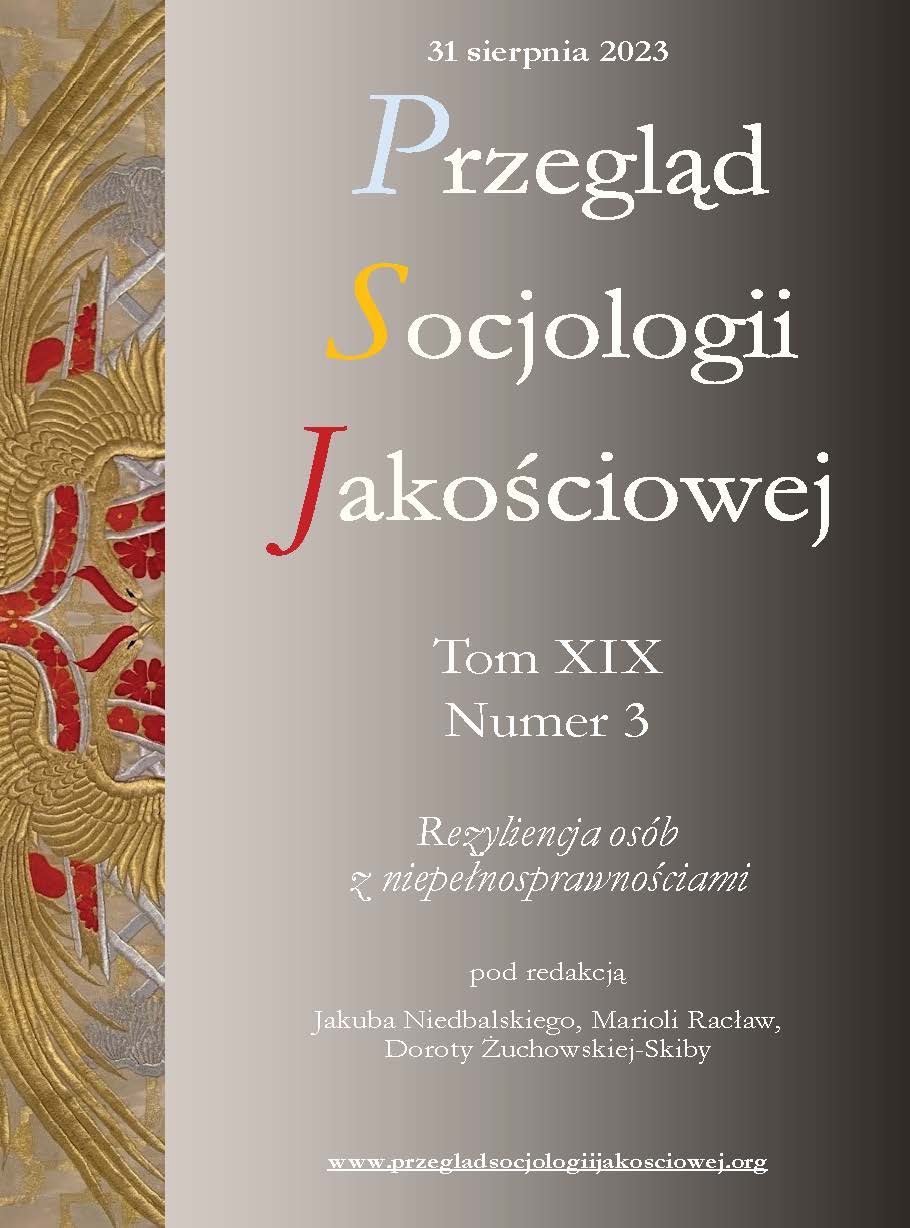Od redaktorów. Niepełnosprawność i osoby z niepełnosprawnościami w zmieniającej się i niepewnej rzeczywistości
DOI:
https://doi.org/10.18778/1733-8069.19.3.01Słowa kluczowe:
rezyliencja, niepewność, zmiana, niepełnosprawność, kryzysyAbstrakt
Artykuł stanowi wstęp do numeru tematycznego, podejmującego zagadnienia niepewności i zmiany w kontekście niepełnosprawności. Życie osób z niepełnosprawnością zawsze było pełne wyzwań, ale w dzisiejszych czasach, charakteryzujących się zmiennością i niepewnością, mogą się one jeszcze bardziej pogłębić. Epidemie, kryzysy i inne czynniki zewnętrzne wpływają na wszystkich, ale dla osób z niepełnosprawnościami mają szczególne konsekwencje. W takich sytuacjach ważne staje się określenie czynników zwiększających poziom rezyliencji (ang. resilience), który może pomóc przetrwać i dostosować się do zmieniających się warunków życia. Sprawia to, że warto dziś dyskutować nie tylko o ryzyku wynikającym ze zmieniającej się rzeczywistości, ale i o mechanizmach oraz strategiach pozwalających na radzenie sobie z niepewnością i trudnościami. Wątki te będą podejmowane przez autorów i autorki, którzy w artykułach składających się na ten numer przedstawią bariery i ograniczenia, zarówno w sferze fizycznej, jak i społecznej, z którymi muszą mierzyć się osoby z niepełnosprawnościami w niepewnej, zmieniającej się rzeczywistości, oraz odpowiedź tego środowiska na przeciwności i sposoby radzenia sobie z trudnościami.
Pobrania
Bibliografia
Armitage Richard, Nellums Laura (2020), The COVID-19 response must be disability inclusive, „The Lancet Public Health”, vol. 5(5), s. 257–261, https://doi.org/10.1016/S2468-2667(20)30076-1
Google Scholar
DOI: https://doi.org/10.1016/S2468-2667(20)30076-1
Armstrong Megan, Aker Narin, Nair Pushpa, Walters Kate, Barrado‐Martin Yolanda, Kupeli Nuriye, Sampson Elizabeth L., Manthorpe Jill, West Emily, Davies Nathan (2022), Trust and inclusion during the Covid‐19 pandemic: Perspectives from Black and South Asian people living with dementia and their carers in the UK, „International Journal of Geriatric Psychiatry”, vol. 37(3), s. 1–13, https://doi.org/10.1002/gps.5689
Google Scholar
DOI: https://doi.org/10.1002/gps.5689
Boyle Coleen, Fox Michael, Havercamp Susan, Zubler Jennefer (2020), The public health response to the COVID-19 pandemic for people with disabilities, „Disability and Health Journal”, vol. 13(3), s. 1–4, https://doi.org/10.1016/j.dhjo.2020.100943
Google Scholar
DOI: https://doi.org/10.1016/j.dhjo.2020.100943
Campbell-Sills Laura, Cohan Sharon L., Stein Murray B. (2006), Relationship of resilience to personality, coping, and psychiatric symptoms in young adults, „Behaviour Research and Therapy”, vol. 44(4), s. 585–599.
Google Scholar
DOI: https://doi.org/10.1016/j.brat.2005.05.001
Crowther Neil (2022), COVID-19 and people with disabilities in Europe: Assessing the impact of the crisis and informing disability-inclusive next steps. Synthesis report with input from the country experts of the European Disability Expertise (EDE), European Commission, https://www.google.com/url?sa=t&rct=j&q=&esrc=s&source=web&cd=&cad=rja&uact=8&ved=2ahUKEwji0LqPn-P_AhWxlIsKHQ0qC0IQFnoECBcQAQ&url=https%3A%2F%2Fec.europa.eu%2Fsocial%2FBlobServlet%3FdocId%3D25862%26langId%3Den&usg=AOvVaw1Pw9NKgBgGW1YBze-06rGR&opi=89978449 (dostęp: 21.05.2023).
Google Scholar
Hartley Michael (2010), Increasing Resilience: Strategies for Reducing Dropout Rates for College Students with Psychiatric Disabilities, „American Journal of Psychiatric Rehabilitation”, vol. 13, s. 295–315, https://doi.org/10.1080/15487768.2010.523372
Google Scholar
DOI: https://doi.org/10.1080/15487768.2010.523372
Hartley Michael (2013), Investigating the Relationship of Resilience to Academic Persistence in College Students with Mental Health Issues, „Rehabilitation Counseling Bulletin”, vol. 56(4), s. 240–250, https://doi.org/10.1177/0034355213480527
Google Scholar
DOI: https://doi.org/10.1177/0034355213480527
Kocejko Magdalena (2021), Sytuacja dzieci z niepełnosprawnościami w czasie pandemii COVID-19 – analiza intersekcjonalna, „Dziecko Krzywdzone. Teoria, Badania, Praktyka”, t. 20(2), s. 76–91.
Google Scholar
Kocejko Magdalena, Bakalarczyk Rafał, Kubicki Paweł (2021), Wpływ pandemii koronawirusa na politykę wobec niepełnosprawności i starości, [w:] Artur Zybała, Krzysztof Księżopolski, Andrzej Bartosiewicz (red.), Polska… Unia Europejska… Świat w pandemii COVID-19. Wybrane zagadnienia, Warszawa: Dom Wydawniczy Elipsa, s. 96–116.
Google Scholar
Lunsky Yona, Jahoda Andriew, Navas Patricia, Campanella Sabrina, Havercamp Susan M. (2022), The mental health and well-being of adults with intellectual disability during the COVID-19 pandemic: A narrative review, „Journal of Policy and Practice in Intellectual Disabilities”, vol. 19(1), s. 35–47, https://doi.org/10.1111/jppi.12412
Google Scholar
DOI: https://doi.org/10.1111/jppi.12412
Luthar Suniya S., Cicchetti Dante (2000), The construct of resilience: Implications for interventions and social policies, „Development and Psychopathology”, vol. 12(4), s. 857–885.
Google Scholar
DOI: https://doi.org/10.1017/S0954579400004156
Masten Ann S. (2014), Global Perspectives on Resilience in Children and Youth, „Child Development”, vol. 85, s. 6–20, https://doi.org/10.1111/cdev.12205
Google Scholar
DOI: https://doi.org/10.1111/cdev.12205
Pieri Mara (2022), When vulnerability got mainstream: Reading the pandemic through disability and illness, „European Journal of Women’s Studies”, vol. 29(1), s. 105S–115S.
Google Scholar
DOI: https://doi.org/10.1177/13505068221090424
Richardson Gleen E. (2002), The metatheory of resilience and resilience, „Journal of Clinical Psychology”, vol. 58, s. 307–321.
Google Scholar
DOI: https://doi.org/10.1002/jclp.10020
Runswick‐Cole Katherine, Goodley Dan (2013), Resilience: A Disability Studies and Community Psychology Approach, „Social and Personality Psychology Compass”, vol. 7(2), s. 67–78, https://doi.org/10.1111/spc3.12012
Google Scholar
DOI: https://doi.org/10.1111/spc3.12012
Ryan Sara, Mikulak Magdalena, Hatton Chris (2023), Whose uncertainty? Learning disability research in a time of COVID-19, „International Journal of Social Research Methodology”, vol. 1, s. 1–13, https://doi.org/10.1080/13645579.2023.2173425
Google Scholar
DOI: https://doi.org/10.1080/13645579.2023.2173425
Scheffers Femke, Moonen Xavier, Vugt Eveline van (2022), External sources promoting resilience in adults with intellectual disabilities: A systematic literature review, „Journal of Intellectual Disabilities”, vol. 2(1), s. 227–243.
Google Scholar
DOI: https://doi.org/10.1177/1744629520961942
Shakespeare Tom, Watson Nicholas, Brunner Richard, Cullingworth Jane, Hameed Shaffa, Scherer Nathaniel, Pearson Charlote, Reichenberger Veronica (2022), Disabled people in Britain and the impact of the COVID‐19 pandemic, „Social Policy and Administration”, vol. 56(1), s. 103–117.
Google Scholar
DOI: https://doi.org/10.1111/spol.12758
Stuntzner Susan, Hartley Michael (2014), Resilience, Coping, & Disability: The Development of a Resilience Intervention, https://www.counseling.org/docs/default-source/vistas/article_44.pdf?sfvrsn=8 (dostęp: 22.05.2023).
Google Scholar
White Brien, Driver Simon, Warren Ann M. (2008), Considering resilience in the rehabilitation of people with traumatic disabilities, „Rehabilitation Psychology”, vol. 53(1), s. 9–17.
Google Scholar
DOI: https://doi.org/10.1037/0090-5550.53.1.9
White Brien, Driver Simon, Warren Ann M. (2010), Resilience and indicators of adjustment from a spinal cord injury, „Rehabilitation Psychology”, vol. 55(1), s. 23–32, https://doi.org/10.1037/a0018451
Google Scholar
DOI: https://doi.org/10.1037/a0018451
Yusuf Afigah, Wright Nicola, Steiman Mandy, Gonzalez Miriam, Karpur Arun, Shih Andy, Shikako Keiko, Elsabbagh Mayada (2022), Factors associated with resilience among children and youths with disability during the COVID-19 pandemic, „PLOS ONE”, vol. 17(7), e0271229, https://doi.org/10.1371/journal.pone.0271229
Google Scholar
DOI: https://doi.org/10.1371/journal.pone.0271229
Pobrania
Opublikowane
Wersje
- 2023-10-27 - (2)
- 2023-08-31 - (1)
Jak cytować
Numer
Dział
Licencja

Utwór dostępny jest na licencji Creative Commons Uznanie autorstwa – Użycie niekomercyjne – Bez utworów zależnych 4.0 Międzynarodowe.














